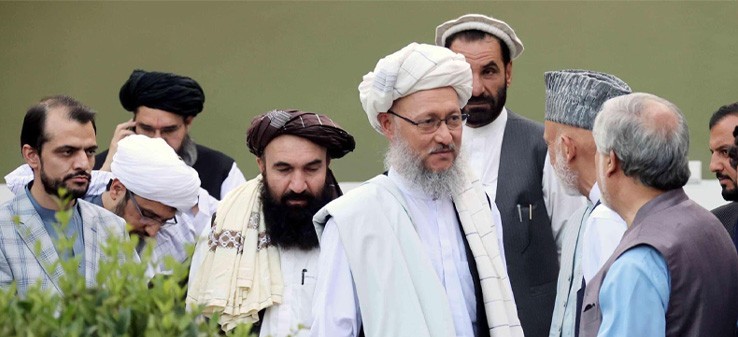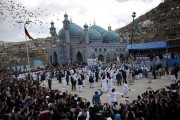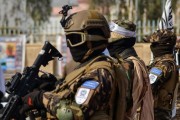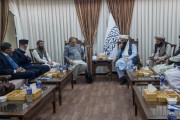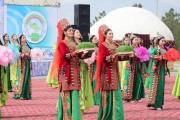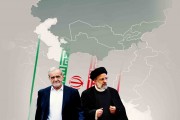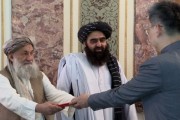Publish Date
Saturday 28 December 2024 - 12:30
recommended
0
Realizing the Intra-Afghan Negotiations: Why and How?
The concept of intra-Afghan negotiations for achieving real peace in Afghanistan is a secondary and post-conflict process. In other words, the goal of negotiations is to transition from conflict to sustainable peace in Afghanistan. In this approach, it is logical to first identify the roots of the tension and conflict in Afghanistan. In this way, two goals can be achieved: (1) identifying the scope and dimensions of intra-Afghan negotiations, and (2) designing a roadmap for transitioning from conflict to peace, based on the realities of Afghanistan.
By: Abdul Rahim Kamel
1. Introduction
2. Roots of Conflict in Afghanistan
A: Lack of Mutual Understanding
B: Relative Deprivation, and Lack of National Interests
3. The Necessity and Logic of Conducting Comprehensive National Negotiations
A: Continuation of the Conflict, and failure of Existing Order
B: Continuation of the Conflict, and Social and Psychological
Disturbance
C: Continuation of the Conflict, and Economic Collapse of Society
4. The Taliban's Role in Realizing Intra-Afghan Negotiations
5.Requirements of Intra-Afghan Negotiations
A: Understanding the Political Power Structure in Afghanistan
B: Avoiding Repeating Past Mistakes
C: Convincing and Preparing Political Parties for Negotiation
D: Using A Credible Mediator
6.Conclusion
1. Introduction
2. Roots of Conflict in Afghanistan
A: Lack of Mutual Understanding
B: Relative Deprivation, and Lack of National Interests
3. The Necessity and Logic of Conducting Comprehensive National Negotiations
A: Continuation of the Conflict, and failure of Existing Order
B: Continuation of the Conflict, and Social and Psychological
Disturbance
C: Continuation of the Conflict, and Economic Collapse of Society
4. The Taliban's Role in Realizing Intra-Afghan Negotiations
5.Requirements of Intra-Afghan Negotiations
A: Understanding the Political Power Structure in Afghanistan
B: Avoiding Repeating Past Mistakes
C: Convincing and Preparing Political Parties for Negotiation
D: Using A Credible Mediator
6.Conclusion
1- Introduction
The concept of intra-Afghan negotiations for achieving real peace in Afghanistan is a secondary and post-conflict process. In other words, the goal of negotiations is to transition from conflict to sustainable peace in Afghanistan. In this approach, it is logical to first identify the roots of the tension and conflict in Afghanistan. In this way, two goals can be achieved: (1) to identify the scope and dimensions of intra-Afghan negotiations, and (2) to design a roadmap for transitioning from conflict to peace, based on the realities of Afghanistan. Hence, the fundamental question is: What is the root of the war and conflict in Afghanistan?
Sociological studies of war and peace show that the concepts of "tension", "war" and "conflict" are different from each other. "Tension" refers more to hidden conflicts that may not lead to practical and bloody reactions. "War" indicates a situation in which the parties to a conflict have engaged in a bloody action. However, "conflict" has a more comprehensive state and its meaning goes beyond war and tension. In a conflict, the parties may engage in violent and bloody actions, or their actions may continue in the form of a cold war.
"Competition" is also a specific concept that encompasses the initial stages of a conflict. It can be said that in a conflict situation, each party tries to prevent the opponent from achieving its goals, to remove him from the scene of competition and even destroy him completely if necessary. Therefore, Afghanistan's political conflicts have many factors and, in a different perspective, even foreign interventions can be linked to Afghanistan's internal conflicts.
2- Roots of Conflict in Afghanistan
Looking at the power structure in Afghanistan’s traditional and tribal society, we can see that two factors have been the main roots of conflicts throughout Afghanistan’s political history: (1) lack of mutual understanding, and (2) relative deprivation, and lack of national interests.
A. Lack of mutual understanding
From a sociological perspective, misperceptions of the other side always prevent understanding and acceptance, and provide the basis for a conflict. In countries where their communities live as isolated islands, when the social distance between them increases, their lack of understanding of each other also increases. This creates social divisions. In Afghanistan, the country’s different ethnic groups have not had an accurate understanding of each other, and have always viewed each other with unrealistic historical perceptions related to the past.
Different ethnicities, religions, and cultures in a country create cultural richness, and increase the country’s social and cultural capital. In fact, this is a great advantage for the country. However, in Afghanistan, the lack of a proper understanding of the nature of the plurality of ethnicities, religions, and local cultures has led to ongoing conflicts. One of the reasons for social intolerance is the incomplete understanding and weakness of public knowledge. Past governments have deliberately tried to exacerbate negative perceptions among different ethnicities. This can easily encourage groups to create and perpetuate conflicts. When different ethnicities and religions do not understand each other properly, a kind of “othering” is created in the society. This sense of othering, when mixed with political campaigns, considers a large part of society as “aliens”, deprives them of national privileges, and removes them from the public sphere.
B. Relative Deprivation, and Lack of National Interests
National interests provide a sense of collective participation. If national benefits and privileges are distributed unfairly, how can we expect collective participation from everyone? What motivates a person to be more active is the amount of benefits he receives in return for his activity.
By distributing national resources and privileges fairly, public conflicts can be prevented and communities can be encouraged to maintain the existing order. Otherwise, even if governments can establish order by force, real peace has not been achieved. In such a context, tensions are seemingly contained, but the center of dissatisfaction remains active. Therefore, real peace depends on real and inclusive justice. As long as certain classes and citizens enjoy certain privileges, and other citizens feel relative and imposed deprivation, lasting peace will not be formed and latent conflicts will always remain.
Historically, discrimination and injustice in Afghanistan have led to conflict, exclusion and denial of each other, and this internal conflict has paved the way for the intervention of colonialists and foreign countries in Afghanistan. This historical reality in the political life of Afghanistan can never be denied or ignored.
Another undeniable fact is that all parties involved in Afghanistan must understand that Afghanistan is a “land of diversity” in terms of ethnicity and religion. The elimination and denial of any social force in Afghanistan may disrupt public order in the country’s political space. Since the 1978 coup against Daoud Khan, this bitter historical experience has continued in various forms in all Afghan systems, and has had irreparable consequences for Afghans. Given that this unfortunate situation continues today, it is necessary to pay serious attention to the model of “mutual acceptance and negotiation for the realization of collective participation” in the political structure of Afghanistan, before it become too late.
As mentioned above, the persistence of conflict in Afghanistan is rooted in the political power structure, which in the political history of this country has been based on exclusion and denial of each other. The political conflict in the country will be resolved when a real solution for the participation of all ethnic and religious groups in the power structure is defined and implemented through national negotiations.
3- The Necessity and Logic of Conducting Comprehensive National Negotiations
Now that the Taliban government must determine the fate of Afghanistan, it is necessary to use its wisdom to stop the vicious cycle of conflict at this stage in history. The Taliban can invite all Afghan parties and groups to hold a Loya Jirga, and prepare a new constitution based on the current situation in Afghanistan and the situation of all Afghan tribes and groups. Naturally, the type of government in this constitution will be Islamic, but the distribution of power must be in accordance with the principle of religious democracy. This type of religious democracy, which is based on national participation, is one of the most successful governments in countries with similar characteristics to Afghanistan.
Unlike the past two decades, the Taliban government is now the main actor in Afghanistan, with complete and exclusive power over the country’s affairs. Therefore, by holding genuine peace talks to form an inclusive government, the Taliban can easily institutionalize a model of cohesion and inclusion in Afghanistan forever – the first outcome of which will be a “comprehensive and lasting peace” in Afghanistan.
Another fundamental and vital result of these negotiations is that by involving all ethnic and religious groups in the structure of the future government, the Taliban can easily provide all Afghans with a sense of “public ownership” in the political power structure, which in turn will ensure the sustainability of their government. When there is a sense of collective ownership in political power, all people and political parties join hands to support and protect the established government, and stand against potential threats.
Otherwise, the continuation of the status quo, the survival of opposition and militant groups, and the double games of some intervening countries, pose at least three scenarios for the future of Afghanistan and the Taliban government, as follows:
Unlike the past two decades, the Taliban government is now the main actor in Afghanistan, with complete and exclusive power over the country’s affairs. Therefore, by holding genuine peace talks to form an inclusive government, the Taliban can easily institutionalize a model of cohesion and inclusion in Afghanistan forever – the first outcome of which will be a “comprehensive and lasting peace” in Afghanistan.
Another fundamental and vital result of these negotiations is that by involving all ethnic and religious groups in the structure of the future government, the Taliban can easily provide all Afghans with a sense of “public ownership” in the political power structure, which in turn will ensure the sustainability of their government. When there is a sense of collective ownership in political power, all people and political parties join hands to support and protect the established government, and stand against potential threats.
Otherwise, the continuation of the status quo, the survival of opposition and militant groups, and the double games of some intervening countries, pose at least three scenarios for the future of Afghanistan and the Taliban government, as follows:
Continuation of the Conflict, and failure of Existing Order
The Taliban's 20-year struggle as a militant group with the then Afghan government led to the government's failure and ultimately its complete collapse. This model of struggle, just as it led to the Taliban's victory over the republican government, will also be promising for groups opposing the Taliban.
Experience has shown that internal militants, in the form of guerrilla warfare, gradually weaken the power of the central government, erode its strength, and eventually turn it into a failed state. Considering that failed states are unable to defend and control their territory, the country easily becomes a field for internal unrest and for the activities of illegal organizations. Armed groups opposing the government easily coordinate with external powers, or even are established with their coordination.
Although the Taliban currently has absolute rule over the entire territory of Afghanistan, sources of danger and potential harm still exist in the background of the country. If these sources of danger are not wisely addressed, the ruling power may be challenged as in the past. This is while all the Afghan people, political leaders, and regional countries are currently worried about the re-emergence of a power vacuum and anarchy in Afghanistan, and all their efforts are focused on the survival and implementation of acceptable reforms in the current Taliban government structure. This common goal and belief can help stop the repeated collapse of systems in Afghanistan. The Taliban government can also easily use this common belief to create a lasting peace, through national and regional dialogues in Afghanistan.
Experience has shown that internal militants, in the form of guerrilla warfare, gradually weaken the power of the central government, erode its strength, and eventually turn it into a failed state. Considering that failed states are unable to defend and control their territory, the country easily becomes a field for internal unrest and for the activities of illegal organizations. Armed groups opposing the government easily coordinate with external powers, or even are established with their coordination.
Although the Taliban currently has absolute rule over the entire territory of Afghanistan, sources of danger and potential harm still exist in the background of the country. If these sources of danger are not wisely addressed, the ruling power may be challenged as in the past. This is while all the Afghan people, political leaders, and regional countries are currently worried about the re-emergence of a power vacuum and anarchy in Afghanistan, and all their efforts are focused on the survival and implementation of acceptable reforms in the current Taliban government structure. This common goal and belief can help stop the repeated collapse of systems in Afghanistan. The Taliban government can also easily use this common belief to create a lasting peace, through national and regional dialogues in Afghanistan.
Continuation of the Conflict, and Social and Psychological Disturbance
Sociological studies of war and peace clearly demonstrate that war is a context for creating a mass of victims. War imposes extensive social consequences on society that cannot be easily compensated for many years. In many wars, mass killings have been carried out with the aim of ethnic and racial cleansing.
Although the Taliban now has total control over Afghanistan, if this rule does not lead to negotiations and national understanding in Afghanistan, the latent complexes of the opposing parties will once again plunge the country into another potential conflict. This is because the most important psychological effect of exclusion and conflict is the creation of complexes. If the conflict is not resolved based on a comprehensive mechanism, the defeated party will feel humiliated, and will sooner or later seek revenge. The exclusion of the Taliban from the Bonn process (2001) was a form of humiliation for the Taliban that later showed its consequences.
Although the Taliban now has total control over Afghanistan, if this rule does not lead to negotiations and national understanding in Afghanistan, the latent complexes of the opposing parties will once again plunge the country into another potential conflict. This is because the most important psychological effect of exclusion and conflict is the creation of complexes. If the conflict is not resolved based on a comprehensive mechanism, the defeated party will feel humiliated, and will sooner or later seek revenge. The exclusion of the Taliban from the Bonn process (2001) was a form of humiliation for the Taliban that later showed its consequences.
Continuation of the Conflict, and Economic Collapse of Society
War requires logistics, and without money, war can never be waged. War consumes national budgets, and war costs replace public services. That is why developing countries are extremely war-averse.
The re-ignition of war in remote areas of Afghanistan will once again lead to the production and transit of drugs, illegal mining, and trafficking of people and illegal goods. One of the motives for inciting war and insecurity in Afghanistan is the creation of a black market for the economic mafia inside Afghanistan. At the transnational level, it is also likely that rival powers are trying to influence the economic order of the region, by spreading insecurity from Afghan soil to other regional countries. The Taliban government should constantly consider the fact that the cost of peace and reconciliation through inclusive negotiations is far less than the cost of continuing war and conflict.
4- The Taliban's Role in Realizing Intra-Afghan Negotiations
A review of the two decades of Western presence in Afghanistan and the state of the Western-backed Afghan government shows that the peace process, with all its heavy costs, has never been real, and there has been no unified management and will to realize it. It seems that the ground for real peace talks is now much more prepared than in the past. Unlike the past two decades, the Taliban is now the only unified and dominant power throughout Afghanistan, and can easily launch real peace talks and manage them with a unified will. With the defeat and withdrawal of NATO and the US from Afghanistan and the Taliban’s return to power, it was expected that the Taliban would have learned a good lesson from the bitter events of Afghanistan’s contemporary history, and would properly steer the situation towards national dialogue and national participation – but unfortunately, this did not happen.
After the Taliban regained power in Afghanistan, evidence showed that the group’s interpretation of the type of governance remained unchanged. Over the past three years, Taliban leaders have repeatedly called the Kabul caretaker government as a fully inclusive government, and have called on neighboring countries and the international community to fulfill their responsibilities and recognize the Kabul government. However, the lack of presence and balanced participation of Afghanistan’s different ethnic and religious groups in the Taliban government structure has prevented regional and international countries from recognizing the Taliban government as an inclusive and national government. This is why the international community has always called on the Taliban government to establish a “truly inclusive government.”
For the international community, only a national and inclusive government that represents all Afghan social groups can be officially recognized. But the Taliban government has so far resisted the realization of such a government with all its might.
In addition, another thing that actually hinders the desired negotiations is that the Taliban has practically banned the activities of all political parties, as well as social, religious and civil institutions in Afghanistan. Consequently, the presence and participation of these parties and institutions in a Taliban-led government is also prohibited. On the other hand, women's education and work in government institutions have been prohibited, for reasons that are still not entirely clear. This is while one of the conditions set by the international community and the Afghan people for the realization of truly national negotiations that can lead to an inclusive government is the respect for women's rights - including women's rights to education and work, and the need for their participation in determining the future of Afghanistan.
Therefore, the view of the Afghan people and the international community on the concept of national negotiations is very different from the Taliban’s consistent interpretation of the concept of negotiation, participation, and governance. This contradiction stands as a fundamental challenge to intra-Afghan negotiations.
With this perspective, both theoretically and practically, the Taliban leaders have a fixed and unchanging view of the type of Islamic system, statehood, and governance. This is while stakeholders in Afghanistan interpret this view as a kind of negation of political diversity and women's participation, and in political terms, it is interpreted as a "monopoly of power." In any case, this is seen as a kind of challenge and a major deadlock in the path of intra-Afghan talks.
5- Requirements of Intra-Afghan Negotiations
Concepts such as negotiation, intra-Afghan talks, peace talks, national understanding, national reconciliation, and inclusive government have all been painful and fruitless concepts that have been repeated in the half-century of contemporary Afghan history. Meanwhile, “intra-Afghan talks” is a newer concept that was introduced after the political agreement between the United States and the Taliban in Qatar, with the aim of forming a political dialogue among Afghans themselves for the future of Afghanistan. These talks were supposed to replace the previous peace talks in Afghanistan, after the US withdrawal from Afghanistan.
Considering the factors behind the failure of the intra-Afghan talks between representatives of the former government and the Taliban in Qatar in 2021, the following four principles seem essential for the formation of a truly meaningful intra-Afghan negotiation:
The re-ignition of war in remote areas of Afghanistan will once again lead to the production and transit of drugs, illegal mining, and trafficking of people and illegal goods. One of the motives for inciting war and insecurity in Afghanistan is the creation of a black market for the economic mafia inside Afghanistan. At the transnational level, it is also likely that rival powers are trying to influence the economic order of the region, by spreading insecurity from Afghan soil to other regional countries. The Taliban government should constantly consider the fact that the cost of peace and reconciliation through inclusive negotiations is far less than the cost of continuing war and conflict.
4- The Taliban's Role in Realizing Intra-Afghan Negotiations
A review of the two decades of Western presence in Afghanistan and the state of the Western-backed Afghan government shows that the peace process, with all its heavy costs, has never been real, and there has been no unified management and will to realize it. It seems that the ground for real peace talks is now much more prepared than in the past. Unlike the past two decades, the Taliban is now the only unified and dominant power throughout Afghanistan, and can easily launch real peace talks and manage them with a unified will. With the defeat and withdrawal of NATO and the US from Afghanistan and the Taliban’s return to power, it was expected that the Taliban would have learned a good lesson from the bitter events of Afghanistan’s contemporary history, and would properly steer the situation towards national dialogue and national participation – but unfortunately, this did not happen.
After the Taliban regained power in Afghanistan, evidence showed that the group’s interpretation of the type of governance remained unchanged. Over the past three years, Taliban leaders have repeatedly called the Kabul caretaker government as a fully inclusive government, and have called on neighboring countries and the international community to fulfill their responsibilities and recognize the Kabul government. However, the lack of presence and balanced participation of Afghanistan’s different ethnic and religious groups in the Taliban government structure has prevented regional and international countries from recognizing the Taliban government as an inclusive and national government. This is why the international community has always called on the Taliban government to establish a “truly inclusive government.”
For the international community, only a national and inclusive government that represents all Afghan social groups can be officially recognized. But the Taliban government has so far resisted the realization of such a government with all its might.
In addition, another thing that actually hinders the desired negotiations is that the Taliban has practically banned the activities of all political parties, as well as social, religious and civil institutions in Afghanistan. Consequently, the presence and participation of these parties and institutions in a Taliban-led government is also prohibited. On the other hand, women's education and work in government institutions have been prohibited, for reasons that are still not entirely clear. This is while one of the conditions set by the international community and the Afghan people for the realization of truly national negotiations that can lead to an inclusive government is the respect for women's rights - including women's rights to education and work, and the need for their participation in determining the future of Afghanistan.
Therefore, the view of the Afghan people and the international community on the concept of national negotiations is very different from the Taliban’s consistent interpretation of the concept of negotiation, participation, and governance. This contradiction stands as a fundamental challenge to intra-Afghan negotiations.
With this perspective, both theoretically and practically, the Taliban leaders have a fixed and unchanging view of the type of Islamic system, statehood, and governance. This is while stakeholders in Afghanistan interpret this view as a kind of negation of political diversity and women's participation, and in political terms, it is interpreted as a "monopoly of power." In any case, this is seen as a kind of challenge and a major deadlock in the path of intra-Afghan talks.
5- Requirements of Intra-Afghan Negotiations
Concepts such as negotiation, intra-Afghan talks, peace talks, national understanding, national reconciliation, and inclusive government have all been painful and fruitless concepts that have been repeated in the half-century of contemporary Afghan history. Meanwhile, “intra-Afghan talks” is a newer concept that was introduced after the political agreement between the United States and the Taliban in Qatar, with the aim of forming a political dialogue among Afghans themselves for the future of Afghanistan. These talks were supposed to replace the previous peace talks in Afghanistan, after the US withdrawal from Afghanistan.
Considering the factors behind the failure of the intra-Afghan talks between representatives of the former government and the Taliban in Qatar in 2021, the following four principles seem essential for the formation of a truly meaningful intra-Afghan negotiation:
Understanding the Political Power Structure in Afghanistan
The characteristics and structure of political power in each country are different from those of other countries. The history of developments in Afghanistan's domestic politics shows that, in general, "ethnicity" is a major and determining element in the structure of Afghan political power.
The diversity of ethnic groups and cultures is, in essence, a national asset. However, in Afghanistan, due to the mistakes of the rulers and the historical monopoly of one ethnic group and the deprivation of the rest, this diversity has led to a type of ethnic conflict that has engulfed all layers of society, including politics.
The social structure in Afghanistan is ethnic and tribal. Afghan popular culture, which stems from a tribal society, has caused the country's political culture to remain tribal too. Political elites, which also stem from the tribal context of society, have consistently used tribal affiliations in their competition for political power.
The theory of “ethnic elite competition” clearly shows that ethnic leaders promote a kind of ethnic self-consciousness among their ethnic members, for their own personal interests. According to this theory, ethnic elites in the power structure may be influenced by ethnic affiliations, and move towards ethnic monopolization, in order to maintain their position. On the other hand, any decision-making by the central government can easily arouse ethnic feelings among rival ethnic elites, and mobilize them against the government.
The competition of ethnic elites in the Afghan political space has been going on in this way for many years. Even now, the role of ethnic elites in motivating ethnic feelings in Afghanistan is very active and powerful. The nature of the political conflict in Afghanistan confirms that the real end of this conflict will be achieved when a real and lasting solution for the fair distribution of power in Afghanistan is found.
Therefore, a practical step towards establishing a national state and national stability in Afghanistan can only be taken when the Taliban government, the Taliban opposition, and Afghan actors gain real faith in the undeniable ethnic and religious realities of Afghanistan and its political power structure, as well as the principle of participation of Afghan ethnic and religious groups in the structure of the future state. Otherwise, even if they sit at the table for intra-Afghan talks a hundred more times, nothing much will happen.
B. Avoiding Repeating Past Mistakes
Undoubtedly, the past is a clear mirror for the future. Without learning from the mistakes of the past, one can never draw a correct plan for the future. It should be noted that intra-Afghan talks do not have intrinsic value in themselves, but the outcome determined for them is important. For at least 30 years, the goal of the intra-Afghan talks has been to achieve an inclusive national government in Afghanistan. Now that the Taliban government has come to power, the goal of the intra-Afghan talks is still to form an inclusive national government in the country. Therefore, this national demand is important, and without it, there is no need for intra-Afghan talks.
Due to the long-standing social tensions in Afghanistan, the Afghan academic elites consider a truly inclusive and national government to be the only way to consolidate the nation-building process in Afghanistan. Therefore, we must learn from past mistakes, and carefully examine the failed attempts at nation-building and state-building in the last twenty years. In this way, we will not repeat past mistakes in the process of structuring an inclusive state, and will not cause the collapse of the state. In the contemporary political history of Afghanistan, solutions have been proposed only three times to solve the crisis of ethnic power, state-building, and nation-building, but they have never succeeded.
To overcome the issue of ethnicity in the country’s political power, the Afghan communist system divided society into two major classes: the “oppressed” and the “capitalists.” The communists tried to complete the process of state and nation building in Afghanistan based on social justice and the participation of the oppressed working class. However, due to their misunderstanding of the social realities of Afghanistan, they failed in this process, and were never able to establish a national and inclusive state in Afghanistan.
After that, the Mujahideen government also repeated the same mistake of the Marxists, and ignored the main issue. Instead of providing a solution to the ethnic issue in Afghanistan, the Mujahideen tried to free the country from ethnic politics by providing a model of an Islamic system. But the Mujahideen government never succeeded in this policy, and the ethnic debate intensified in the country more than before. During this period, Afghanistan became an island of ethnic power, and ethnic wars engulfed the country.
With the establishment of the republican system (2001), the Afghan elites and the international community were forced to accept the role of the tribes in Afghan politics, in order to resolve the political conflict in Afghanistan and to establish a national and inclusive state with the participation of all tribes and political factions. At the Bonn Conference in Germany (2001), agreements were made regarding the participation of all tribes in political power. These agreements were reflected in the process of forming the interim government, and were accepted by the tribal elites.
After the way of ethnic groups participation in the government was clarified at the Bonn Conference, ethnic challenges subsided for a while. Although the constitution had prohibited any kind of political behavior based on ethnicity, the mistakes of Afghan statesmen once again distanced the country from a peaceful national atmosphere. Mistakes such as ethnic discrimination in important government appointments, the use of ethnic motives by political elites in election campaigns, the ceremonial and ineffective participation of disadvantaged ethnic groups and Afghan women in government structures, etc., once again disrupted the nation-building process. This situation led to a dangerous deviation in the process of creating a truly national and inclusive state in Afghanistan.
What has been said is to emphasize that past regimes have committed major mistakes, and today's crisis in Afghanistan is their bitter legacy. Therefore, to conduct a meaningful intra-Afghan dialogue and establish lasting peace, it is necessary for the Taliban government, political elites, and stakeholders to first carefully examine the weaknesses and mistakes of the past, and correct them.
C. Convincing and Preparing Political Parties for Negotiation
Evidence shows that the era of absolute authoritarianism and the absorption of different identities into one specific identity has passed. Afghanistan can no longer follow such models too. Therefore, the Taliban government and Afghanistan’s political elites must strive for national reconciliation and ethnic harmony, while recognizing and preserving the rights of all ethnic groups within the country. Afghan citizens and the country’s political and cultural elites must move beyond ethnic divisions, and embrace ethnic tolerance for peaceful coexistence. The Taliban government, political elites, and ethnic leaders must work to build power structures without relying on tribal motivations.
Any government in Afghanistan must seriously consider the bitter experiences of historical ethnic conflicts, and recognize that failing to consolidate social cohesion among all Afghan citizens will easily undermine the foundations of power in today’s world.
The reality is that the time has passed when power could be firmly established and maintained solely with the support of a few ethnic groups or tribes. Afghanistan’s conditions have changed, and governments unable to adapt to present realities will face numerous societal challenges.
Another reality is that every war ultimately leads to peace. Afghanistan is not the only country to have endured internal conflicts; many nations have experienced such destructive paths and eventually achieved lasting peace. It is only crucial to recognize that "Afghanistan will never achieve sustainable peace through war." Negotiation is the only path to lasting peace, often referred to as “positive peace.” Compared to peace achieved through war, positive peace is less costly and more sustainable. However, the path of dialogue becomes challenging when the red lines of opposing parties are fundamentally contradictory and irreconcilable. This was the main reason why Afghanistan’s peace process remained stagnant over the past two decades, and genuine intra-Afghan dialogue never materialized. The current state of conflict and crisis in Afghanistan remains much the same. Despite this, one must not lose hope entirely and must continue exploring and examining elements of peacemaking through dialogue and negotiation.
D. Using a Credible Mediator
Negotiation is not a simple process; it is a complex endeavor requiring careful planning. Bringing opposing parties to the negotiating table, drafting agreements, and implementing them necessitate a competent third party. During the Cold War, this role was often played by the United Nations. A credible mediator must be empowered to oversee the implementation of agreements, so that neither party deviates from them.
In the peace talks between the previous Afghan government and the Taliban, the United States acted as the “third pillar” and mediator. However, neither the U.S. nor Western nations are now considered trustworthy by the Afghan people or regional countries. In the eyes of Afghans, NATO member states and the U.S. have a history of twenty years of failure in Afghanistan. Their irresponsible withdrawal from Afghanistan, leaving the country in a crisis, has eroded their credibility as mediators.
Given this perspective, only regional countries and the United Nations, through mutual efforts, can serve as mediators to facilitate intra-Afghan peace talks aimed at forming an inclusive government in Afghanistan.
The United Nations has experience in Afghanistan, including the crises of the 1990s, the Bonn Agreement (2001), and the Doha meetings hosted by the U.N. Secretary-General. The U.N.’s foundational principles and the Security Council’s responsibilities demand that they act to preserve peace and prevent the escalation of crises in Afghanistan.
Steps for Mediation
To accelerate the process of dialogue between the warring parties in Afghanistan, regional countries and the U.N. must take the following steps, through a joint working group:
The diversity of ethnic groups and cultures is, in essence, a national asset. However, in Afghanistan, due to the mistakes of the rulers and the historical monopoly of one ethnic group and the deprivation of the rest, this diversity has led to a type of ethnic conflict that has engulfed all layers of society, including politics.
The social structure in Afghanistan is ethnic and tribal. Afghan popular culture, which stems from a tribal society, has caused the country's political culture to remain tribal too. Political elites, which also stem from the tribal context of society, have consistently used tribal affiliations in their competition for political power.
The theory of “ethnic elite competition” clearly shows that ethnic leaders promote a kind of ethnic self-consciousness among their ethnic members, for their own personal interests. According to this theory, ethnic elites in the power structure may be influenced by ethnic affiliations, and move towards ethnic monopolization, in order to maintain their position. On the other hand, any decision-making by the central government can easily arouse ethnic feelings among rival ethnic elites, and mobilize them against the government.
The competition of ethnic elites in the Afghan political space has been going on in this way for many years. Even now, the role of ethnic elites in motivating ethnic feelings in Afghanistan is very active and powerful. The nature of the political conflict in Afghanistan confirms that the real end of this conflict will be achieved when a real and lasting solution for the fair distribution of power in Afghanistan is found.
Therefore, a practical step towards establishing a national state and national stability in Afghanistan can only be taken when the Taliban government, the Taliban opposition, and Afghan actors gain real faith in the undeniable ethnic and religious realities of Afghanistan and its political power structure, as well as the principle of participation of Afghan ethnic and religious groups in the structure of the future state. Otherwise, even if they sit at the table for intra-Afghan talks a hundred more times, nothing much will happen.
B. Avoiding Repeating Past Mistakes
Undoubtedly, the past is a clear mirror for the future. Without learning from the mistakes of the past, one can never draw a correct plan for the future. It should be noted that intra-Afghan talks do not have intrinsic value in themselves, but the outcome determined for them is important. For at least 30 years, the goal of the intra-Afghan talks has been to achieve an inclusive national government in Afghanistan. Now that the Taliban government has come to power, the goal of the intra-Afghan talks is still to form an inclusive national government in the country. Therefore, this national demand is important, and without it, there is no need for intra-Afghan talks.
Due to the long-standing social tensions in Afghanistan, the Afghan academic elites consider a truly inclusive and national government to be the only way to consolidate the nation-building process in Afghanistan. Therefore, we must learn from past mistakes, and carefully examine the failed attempts at nation-building and state-building in the last twenty years. In this way, we will not repeat past mistakes in the process of structuring an inclusive state, and will not cause the collapse of the state. In the contemporary political history of Afghanistan, solutions have been proposed only three times to solve the crisis of ethnic power, state-building, and nation-building, but they have never succeeded.
To overcome the issue of ethnicity in the country’s political power, the Afghan communist system divided society into two major classes: the “oppressed” and the “capitalists.” The communists tried to complete the process of state and nation building in Afghanistan based on social justice and the participation of the oppressed working class. However, due to their misunderstanding of the social realities of Afghanistan, they failed in this process, and were never able to establish a national and inclusive state in Afghanistan.
After that, the Mujahideen government also repeated the same mistake of the Marxists, and ignored the main issue. Instead of providing a solution to the ethnic issue in Afghanistan, the Mujahideen tried to free the country from ethnic politics by providing a model of an Islamic system. But the Mujahideen government never succeeded in this policy, and the ethnic debate intensified in the country more than before. During this period, Afghanistan became an island of ethnic power, and ethnic wars engulfed the country.
With the establishment of the republican system (2001), the Afghan elites and the international community were forced to accept the role of the tribes in Afghan politics, in order to resolve the political conflict in Afghanistan and to establish a national and inclusive state with the participation of all tribes and political factions. At the Bonn Conference in Germany (2001), agreements were made regarding the participation of all tribes in political power. These agreements were reflected in the process of forming the interim government, and were accepted by the tribal elites.
After the way of ethnic groups participation in the government was clarified at the Bonn Conference, ethnic challenges subsided for a while. Although the constitution had prohibited any kind of political behavior based on ethnicity, the mistakes of Afghan statesmen once again distanced the country from a peaceful national atmosphere. Mistakes such as ethnic discrimination in important government appointments, the use of ethnic motives by political elites in election campaigns, the ceremonial and ineffective participation of disadvantaged ethnic groups and Afghan women in government structures, etc., once again disrupted the nation-building process. This situation led to a dangerous deviation in the process of creating a truly national and inclusive state in Afghanistan.
What has been said is to emphasize that past regimes have committed major mistakes, and today's crisis in Afghanistan is their bitter legacy. Therefore, to conduct a meaningful intra-Afghan dialogue and establish lasting peace, it is necessary for the Taliban government, political elites, and stakeholders to first carefully examine the weaknesses and mistakes of the past, and correct them.
C. Convincing and Preparing Political Parties for Negotiation
Evidence shows that the era of absolute authoritarianism and the absorption of different identities into one specific identity has passed. Afghanistan can no longer follow such models too. Therefore, the Taliban government and Afghanistan’s political elites must strive for national reconciliation and ethnic harmony, while recognizing and preserving the rights of all ethnic groups within the country. Afghan citizens and the country’s political and cultural elites must move beyond ethnic divisions, and embrace ethnic tolerance for peaceful coexistence. The Taliban government, political elites, and ethnic leaders must work to build power structures without relying on tribal motivations.
Any government in Afghanistan must seriously consider the bitter experiences of historical ethnic conflicts, and recognize that failing to consolidate social cohesion among all Afghan citizens will easily undermine the foundations of power in today’s world.
The reality is that the time has passed when power could be firmly established and maintained solely with the support of a few ethnic groups or tribes. Afghanistan’s conditions have changed, and governments unable to adapt to present realities will face numerous societal challenges.
Another reality is that every war ultimately leads to peace. Afghanistan is not the only country to have endured internal conflicts; many nations have experienced such destructive paths and eventually achieved lasting peace. It is only crucial to recognize that "Afghanistan will never achieve sustainable peace through war." Negotiation is the only path to lasting peace, often referred to as “positive peace.” Compared to peace achieved through war, positive peace is less costly and more sustainable. However, the path of dialogue becomes challenging when the red lines of opposing parties are fundamentally contradictory and irreconcilable. This was the main reason why Afghanistan’s peace process remained stagnant over the past two decades, and genuine intra-Afghan dialogue never materialized. The current state of conflict and crisis in Afghanistan remains much the same. Despite this, one must not lose hope entirely and must continue exploring and examining elements of peacemaking through dialogue and negotiation.
D. Using a Credible Mediator
Negotiation is not a simple process; it is a complex endeavor requiring careful planning. Bringing opposing parties to the negotiating table, drafting agreements, and implementing them necessitate a competent third party. During the Cold War, this role was often played by the United Nations. A credible mediator must be empowered to oversee the implementation of agreements, so that neither party deviates from them.
In the peace talks between the previous Afghan government and the Taliban, the United States acted as the “third pillar” and mediator. However, neither the U.S. nor Western nations are now considered trustworthy by the Afghan people or regional countries. In the eyes of Afghans, NATO member states and the U.S. have a history of twenty years of failure in Afghanistan. Their irresponsible withdrawal from Afghanistan, leaving the country in a crisis, has eroded their credibility as mediators.
Given this perspective, only regional countries and the United Nations, through mutual efforts, can serve as mediators to facilitate intra-Afghan peace talks aimed at forming an inclusive government in Afghanistan.
The United Nations has experience in Afghanistan, including the crises of the 1990s, the Bonn Agreement (2001), and the Doha meetings hosted by the U.N. Secretary-General. The U.N.’s foundational principles and the Security Council’s responsibilities demand that they act to preserve peace and prevent the escalation of crises in Afghanistan.
Steps for Mediation
To accelerate the process of dialogue between the warring parties in Afghanistan, regional countries and the U.N. must take the following steps, through a joint working group:
Developing a Comprehensive Roadmap
The joint working group should hold joint sessions involving Afghan elites, regional stakeholders, and the international community to examine Afghanistan's crisis from all angles. Drawing on past experiences and avoiding previous mistakes, they should develop a “comprehensive roadmap” to guide Afghanistan out of its current situation and establish meaningful intra-Afghan dialogue, with the genuine participation of regional countries and the global community.
Coordinating Dialogue Between the Taliban and Opposition
Once a “comprehensive roadmap” is established, the joint working group should create mechanisms to coordinate dialogue between the Taliban and their opposition, paving the way for negotiations aimed at forming a national and inclusive government to achieve lasting peace in Afghanistan.
Securing Global Cooperation
The joint working group must secure the cooperation and participation of all regional and global countries to ensure a reliable resolution to Afghanistan’s issues and the establishment of a national government acceptable to the international community.
Establishing a Platform for Opposition Representation
To expedite intra-Afghan peace talks and form an inclusive government, the joint working group should provide a specific address in one of the countries to establish a representative office for the opponents of the Taliban government - just as the Taliban representative office for peace talks was established in Qatar.
6- Conclusion
The bitter but instructive lessons in Afghanistan have proven that in the continuation of the country's conflict, all sides and parties are losers. Denying the existence of ethnic groups and religious communities and excluding them from decision-making structures only deepens social divides and undermines lasting stability. Every social and political group in Afghanistan, if excluded and denied, has the potential to act as a threat to the established order, challenging Afghan government in the long term.
The Taliban must also recognize that the cost of national dialogue and reconciliation is significantly lower than the costs of continued conflict with its opponents. Therefore, the Taliban must exhibit historical wisdom and positively respond to the demands of the Afghan people, their neighbors, and regional countries. By facilitating meaningful intra-Afghan dialogues aimed at forming a truly inclusive government, Taliban can open a new chapter in Afghanistan’s history under its own name.
6- Conclusion
The bitter but instructive lessons in Afghanistan have proven that in the continuation of the country's conflict, all sides and parties are losers. Denying the existence of ethnic groups and religious communities and excluding them from decision-making structures only deepens social divides and undermines lasting stability. Every social and political group in Afghanistan, if excluded and denied, has the potential to act as a threat to the established order, challenging Afghan government in the long term.
The Taliban must also recognize that the cost of national dialogue and reconciliation is significantly lower than the costs of continued conflict with its opponents. Therefore, the Taliban must exhibit historical wisdom and positively respond to the demands of the Afghan people, their neighbors, and regional countries. By facilitating meaningful intra-Afghan dialogues aimed at forming a truly inclusive government, Taliban can open a new chapter in Afghanistan’s history under its own name.
Abdul Rahim Kamel, is an Afghan expert
News code:3889




